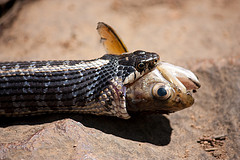 A group of researchers at the Guangdong Academy of Medical Sciences in Guangzhou, China have retracted a paper that came out of a clinical trial on transarterial chemoembolization, a targeted kind of chemotherapy.
A group of researchers at the Guangdong Academy of Medical Sciences in Guangzhou, China have retracted a paper that came out of a clinical trial on transarterial chemoembolization, a targeted kind of chemotherapy.
According to the notice, one of the authors mixed up the control samples with the clinical samples, and “could not recall which samples were in the wrong group.” The paper hasn’t yet been cited, according to Thomson Scientific’s Web of Knowledge.
Here’s the notice in Medical Oncology:
Continue reading Paper on circulating tumor cells taken out of circulation after lab error








